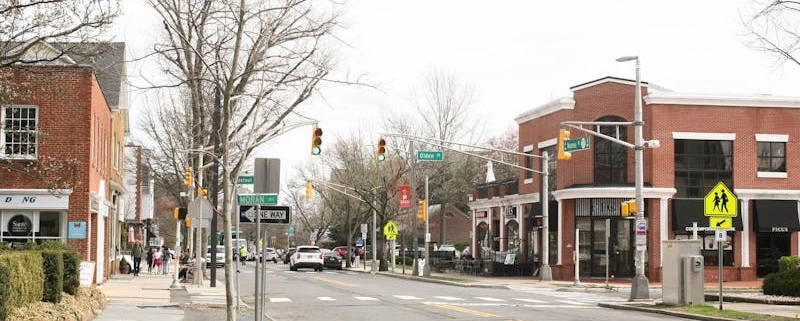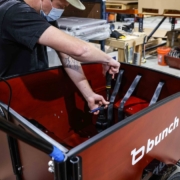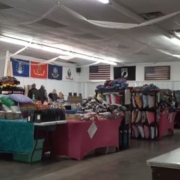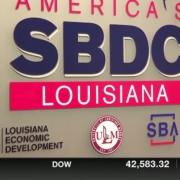‘It feels very existential’: Local businesses react to Trump’s tariffs
Local businesses in Princeton are facing mounting uncertainty due to tariffs imposed by the Trump administration, particularly those targeting Chinese imports. Despite a temporary 90-day pause on some measures, a 10 percent blanket tariff remains, coupled with a 145 percent tariff on all Chinese goods. For small businesses that rely heavily on imports, the impact is already being felt — not just in profit margins, but in their ability to survive.
“To us, it feels very existential,” said Dean Smith, co-owner of jaZams, a toy store on Palmer Square stocked floor-to-ceiling with a colorful array of toys, trinkets, and children’s books. “It feels like if nothing changes, there is a good likelihood that our business will not be in business by next year.”
JaZams imports up to 70 to 80 percent of its inventory, the majority of which comes from China. However, Smith and co-owner Joanne Farrugia “saw the writing on the wall,” and they have rented a 500-square-foot warehouse to stockpile goods. “We’ve been buying more heavily than we ever would have, but we never expected 145 percent,” Smith said.
Other local businesses are adopting similar strategies in anticipation of high prices. Some have convened emergency meetings and purchased months’ worth of extra inventory to avoid raising prices on customers. Yet, in doing so, they have strained the supply chain, overwhelmed distributors, and left ports snarled with cancelled orders as manufacturers back away from Chinese suppliers.
In fact, Smith and Farrugia have observed a feeling of persistent pessimism across manufacturing and distributing sectors during calls with their own distributors. Smith said one distributor had “never felt this pessimistic” about their industry, and it made him “feel kind of ill.”
Even stores that import a smaller share of their goods are feeling the tension. J.McLaughlin, a higher-end clothing boutique, reported growing concern from customers, many of whom are bulk-buying in anticipation of rising prices or disappearing inventory.
At Agricola, a popular farm-to-table restaurant, the impact of tariffs has been more muted. “If there’s any price increases due to tariffs, we don’t really see those as a long-term issue,” said Scott Edie, Agricola’s manager.
Edie specified that he avoids raising prices, cutting portions, or lowering quality of service, though he mentioned this was a necessity during the COVID-19 pandemic due to competition. “We saw price increases up over 100 percent, 150 percent on certain items, and of course, we had to react to those prices to maintain a profit,” said Edie. He added that “as soon as those supply chain kinks work themselves out, we lower [rates] back down,” insisting that any price fluctuations occurring now are merely a result of seasonal trends.
The Princeton Record Exchange has also experienced minimal impacts from tariffs at this point in time, suffering more from price increases and the overall uncertainty felt by many others throughout town. Jon Lambert, the store’s owner, believes the fact that around “three-quarters” of his merchandise is used has been his “saving grace” because it allows him to be “reactive” and adaptable to changing circumstances.
“We’re very used to shifting our priorities as we get different products in, and I think that will help us to some extent,” Lambert said. “We’re lean because we’re independent … In some ways, an independent store is a little bit better equipped to deal with crisis.”
Similarly, Brian Asack, the owner of New York Camera of Princeton, has been somewhat protected since he primarily sells used products and services rather than new merchandise. In addition, he said there is “a lot of passport photo business being generated” right now in anticipation of the Real ID system being activated this May, which has actually resulted in “an uptick in business.”
“The stuff that we make our money on and make our living on is used cameras, passport photos, film developing, and video transfers, and all of those things aren’t really affected by tariffs,” Asack said. He also added that the nature of entertainment industries provides his store with a bit of a buffer when it comes to economic downturns. “[Photography] is kind of one of those feel-good hobbies that people can turn to even when things are bad, so when the economy is worse, it’s actually not so bad for us.”

Lambert also sees entertainment as “a little bit inflation-proof,” especially when it comes to inexpensive entertainment like one-dollar records. Customers “can still enjoy themselves and have fun when they’re experiencing hardship for not a huge amount of money,” he said.
Still, for many small business owners in Princeton, the question is not whether tariffs will force changes, but when. Smith and Farrugia remain hopeful for a small business carve-out from the tariff policy, hoping to avoid raising prices for consumers. However, the outlook remains dim.
“You can’t continue to absorb those kinds of increases, because you have to pay your rent, right, your staff, you know,” said Smith. “It’s so tenuous.”
Megan Cameron is a staff News writer for the ‘Prince.’
Abby Leibowitz is a senior News writer for the ‘Prince’ from Silver Spring, Md.
Please send any corrections to corrections[at]dailyprincetonian.com











